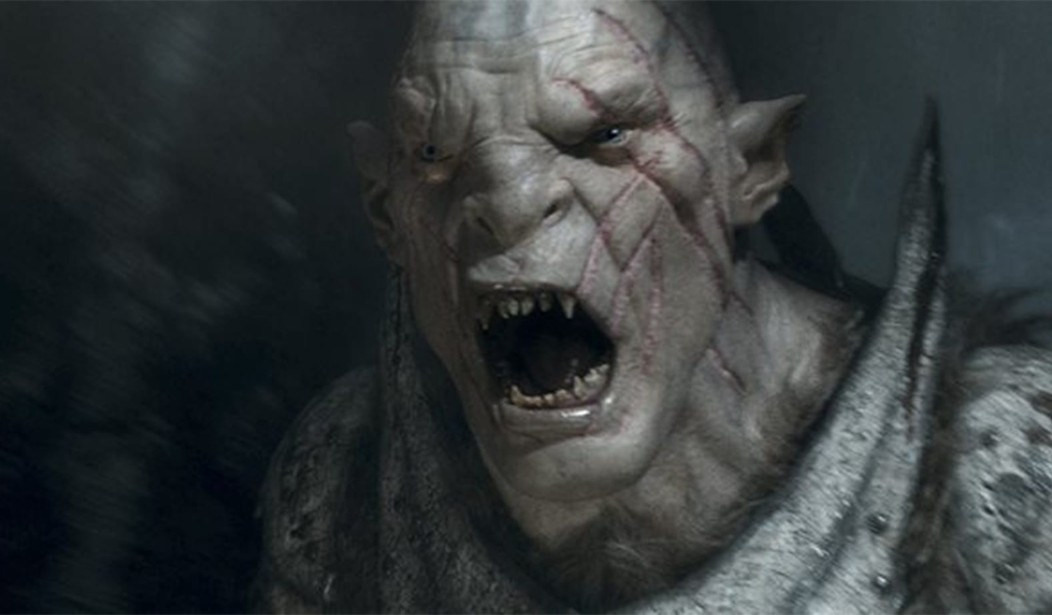Identity politics is like a highly addictive drug in that once you hook yourself on it, it becomes the filter through which you experience your reality.
Critical theory will taint every node of your interaction with the world you find yourself in. Everything must be examined for anything that might cause a social ill toward a protected group, and if one doesn’t exist, you can create one if your dislike of the thing you’re analyzing is strong enough. This isn’t too difficult as identity politics and critical theory will make you dislike nearly everything.
The latest thing that identitarian social justice warriors have turned their attention to is the beloved works of arguably the greatest fantasy author of all time, J.R.R. Tolkien.
According to Wired, author Andy Duncan put Tolkien’s work — which includes The Hobbit and The Lord of the Rings series — under the microscope and deduced that it may cause a normalization of racism in the reader due to its outlook of trolls, orcs, and other foul beasts found within the pages.
Duncan penned a story called “Senator Bilbo,” in which Bilbo is painted as a “racist demagogue” who is attempting to keep the Shire like it was after the War of the Ring opened it to the world, according to Wired, and Duncan makes it no secret that his story is — surprise, surprise — a commentary on the Trump administration:
The story, which appears in Duncan’s new collection An Agent of Utopia, was also inspired by Michael Moorcock, who has criticized Tolkien for depicting creatures such as orcs, trolls, and goblins as intrinsically evil.“It’s hard to miss the repeated notion in Tolkien that some races are just worse than others, or that some peoples are just worse than others,” Duncan says. “And this seems to me—in the long term if you embrace this too much—it has dire consequences for yourself and for society.”“Senator Bilbo” first appeared in 2001, but its references to border walls and a “Shire First” policy make it seem more relevant than ever. Duncan says that’s because the story deals with themes that are, unfortunately, timeless. “In many ways President Trump is unique, but in many ways, we have seen his like before,” he says. “We have seen the forces that he has tapped into on the ascendency before.”
To peel back the curtain so you can see the ideological thinking behind it, Duncan is making the tired social justice argument that many of the races we are lead to hate aren’t actually evil, their cultures are just different from ours and thus our dislike of them is a result of racism, xenophobia, etc.
Tolkien included miles of background story and lore that describes the reason for the existence of everything in his universe down to why sometimes trees grow the way they do, but to sum trolls and orcs in particular, they were malformed creations by the evil god of that realm in order to bring about death and destruction for evil reasons.
Orcs and trolls within the story are evil things that exist for evil reasons. The populace finds themselves siding against creatures like these in great number because the vast majority of the human race dislikes evil. Disliking evil isn’t racism, and it’s definitely not a hatred developed within a population thanks to a demagogic leader. We hate evil because evil is disruptive and harmful.
Lord of the Rings and other Tolkien stories don’t encourage racism; they ring the instinctive bell in our brain that wants to fight against and defeat that which would bring death and destruction against us.
However, the laws of social justice force those hooked on it to view the baddies of Tolkien’s universe as the “other” races in the real world. Tolkien ceases to be a fantasy writer and is now forced into the column of political commentator. His view of some races as evil somehow translates to the real world, and without much warning, Tolkien becomes an evil, racist xenophobe.
That the SJW’s notion to compare orcs and trolls to cultures outside of America is racist is apparent in itself. It’s very typical of the identity politics crowd to assume racism where there is none by cooking up racist commentary themselves and forcing that commentary into the mouths of others.
But with that said, oftentimes what we consider evil isn’t the result of us looking at the world through a lens of racism or xenophobia. It’s us looking at the actions and beliefs of some and dubbing that philosophy evil because it is.
Stoning, whipping, or killing women because they were raped or learned how to spell without permission is evil. Kidnapping children and selling them into sex slavery is evil. Distributing harmful drugs that affect the lives of entire towns for a profit is evil.
Illegally sneaking across a country’s border in order to take part in their success, while not inherently evil, still brings with it a host of problems that plague the citizens of the country you fled to, and that is a problem that should be addressed without the accusation that addressing the problem is racist.
Again, Americans aren’t comparing migrants from Mexico, or the entire population of the Middle-Eastern world to orcs and trolls. The SJWs are comparing these peoples to evil creatures for the purposes of declaring the rest of the population believes it. The general population is more nuanced in their thinking than that.
Tolkien encourages us to fight evil, not races. In fact, one of the central tenets of his story is races that are prejudiced against each other learning how to come together and appreciate one another. This is apparent to anyone who read the books or even saw Peter Jackson’s movies.
However, identity politics doesn’t allow for this kind of deduction. Everything is racist, everything is sexist, and everything is horrible.
The world of social justice is a very boring, and extremely ridiculous place.













Join the conversation as a VIP Member